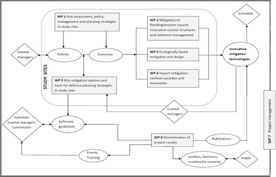Strategy
|
The overall strategy of THESEUS is to learn from the experiences in selected study sites, develop innovative “climate proof technology” and propose an integrated approach for selecting among these technologies the proper mitigation option in the study sites. This overall strategy allows:
|
|
|
The overview of THESEUS workplan is that we have 2 WPs, n.1 and n.5, running in series and 3 WPs, n.2, n.3 and n.4, running in parallel. When we say “in series” and “in parallel” we refer to the execution of the WPs in time.
WPs 1 and 5 are integrated platforms that combine all kind of expertise present in THESEUS and apply these expertise directly in study sites. On the contrary, WPs 2, 3 and 4 are specifically dedicated to coastal engineering, ecology and socio-economy respectively. This kind of organization assures from one side that the project results will be integrated multi-disciplinary results, and from the other side that mitigation technologies will be analysed well in-depth within each branch of expertise. |
|
|
The first step in the project research, consisting of WP 1, is the
WP 1 delivers environmental, engineering, socio-economic and climate scenarios in short, mid and long term accounting for climate change issues. Drivers for quantifying the uncertainties in these scenarios will be also provided. Accounting for the scenarios delivered by WP 1, WPs 2, 3 and 4 examine new mitigation measures or combination of existing ones within a very specialist context.
WP 2 investigates multi-purpose innovative coastal defences (such as bottom vegetation, artificial reefs, barriers for wave energy conversion) and soft defence technologies (nourishment on emerged/submerged beach, combined intervention of nourishment and dredging) and develops combinations of the two by means of experiments, numerical models and field observations. WP 3 analyses the impact of flood risk management options on the environment, both in case of adaptation (the “no-defend” option, with periodic seawater inundation in controlled areas) or of active defence. Defence can be done through the engineering measures proposed by WP 2 but can also be done through the development and reinforcement of the environment as dunes, saltmarshes, or biogenic reefs. Ecology will thus not only provide a basic missing knowledge of environmental vulnerability to sea level rise and ingression, but also guidelines to minimize environmental impact of traditional structures and to design ecologically based defences. WP 4 examines the impact of flood and erosion scenarios on society and economy. Spatial planning, urbanization, insurance programs, evacuation plans and risk communication are analysed in depth as ways to promote adaptation and resilience and proper mitigation option plans are provided. The portfolio of the new mitigation options developed within WPs 2, 3 and 4, together with the knowledge regarding the existing and future level of risk, existing policies and defences, are the basic inputs to WP 5. This WP develops an integrated multidisciplinary approach for the selection of the sustainable mitigation option among the solution proposed in study sites. This WP also provides, based on this approach, a critical synthesis of the scientific results in terms of implementation of future policies, of guidelines for the ecologically-based design of coastal defences useful for the coastal community and of a GIS-based software tool for coastal risk assessment and planning defence strategies specifically directed to stakeholders and end users. |


